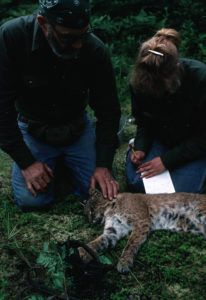March NRC: Expansion of bobcat hunting zones, waterfowl season dates up for action
Expansion of bobcat hunting and trapping is up for action at the March Natural Resource Commission (NRC) meeting.
The meeting is scheduled for Thursday at 9:30 a.m at Lansing Community College West Campus, Rooms M119-121. Lansing Community College requires masks for all students, staff and visitors.
On Thursday, commissioners are expected to take action on a pair of wildlife conservation orders.The first expands bobcat hunting and trapping seasons in the Northern Lower Peninsula and creates a new Southern Lower Peninsula unit.

Michigan United Conservation Clubs (MUCC) supports increased opportunities for recreational hunting and trapping if science points towards no net biological harm. Bobcat populations have remained stable and their range has expanded, said Justin Tomei, MUCC policy assistant.
“As always, the durability of the resource comes first and bobcats are no exception,” Tomei said. “The department has demonstrated that the bobcat population is stable and expanding further and further into Southern Michigan; these changes represent the meaningful conservation successes of the North American Model of Conservation.”
The second order sets the dates and regulations for the state’s waterfowl hunting. These guidelines are set within a federal framework, and the biggest change is the opening day of the north zone and middle zone have two weeks between them.
Under new business, the commission will see a director’s order relating to the results of an oil and gas lease auction and a trio of small land transactions.
Up for information this month is the Department of Natural Resources (DNR) elk regulations for the 2022 and 2023 seasons. The proposed w ildlife conservation order makes no substantial changes to season structure or bag limits, but it does ask the NRC to remove the language allowing the DNR to hold a January hunt.
The DNR says the hunt has not been used since 2008 and that staff is confident of the herds location and their ability to focus the traditional hunt periods. The DNR also says it is unrealistic for hunters to draw a tag in late December and make appropriate plans for a January hunt. Without the January hunt, the DNR suggests that adjusting quotas, if necessary, can provide an adequate management tool if the need arises.
The schedule for the Director’s report is below.
- Partners in Conservation Award – Thomas Schupbach (Kerry Heckman, Forest Resources Division)
- Lake Trout harvest and regulations Northern Lake Huron (Seth Herbst, Fisheries Division)
- Wildlife Conservation Order Amendment No. 1 of 2022 Modification (Adam Bump, Wildlife Division)
- Elk Regulations (Chad Stewart, Wildlife Division)
- Bear Population Trend Analysis Update (Cody Norton, Wildlife Division)
- Legislative Report (Informational Item)
The post March NRC: Expansion of bobcat hunting zones, waterfowl season dates up for action appeared first on Michigan United Conservation Clubs.
Recent Posts



